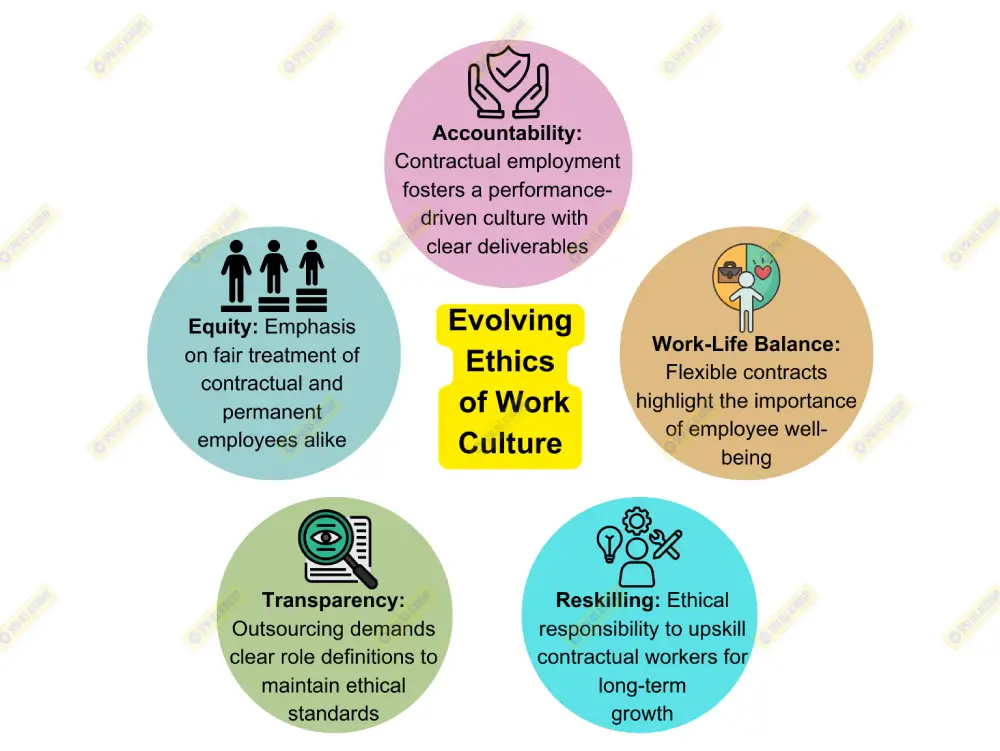The increasing adoption of contractual employment and outsourcing in government departments reflects an effort to enhance efficiency and service delivery. While these measures are seen as pragmatic solutions to reduce costs and improve performance, their long-term impact on work culture and the quality of public services needs deeper scrutiny. Addressing this requires the application of key governance principles such as accountability, efficiency, equity, and transparency, as well as insights from governance thinkers and contemporary examples.
Benefits of Contractual Employment and Outsourcing
1. Efficiency and Flexibility:
Contractual hiring and outsourcing promote agility in recruitment and allow departments to engage specialized personnel for time-bound projects. This flexibility enables quicker implementation of government schemes.
- Example: The outsourcing of IT services for Passport Seva Kendras, managed by TCS, has significantly reduced delays and improved efficiency.
- Governance Principle: This aligns with efficiency, a core principle of governance emphasized by thinkers like Max Weber, who advocated for rational and professional administrative structures.

2. Cost Reduction:
By avoiding the financial burden of pensions and other long-term benefits for permanent employees, the government can allocate resources more effectively toward development projects.
- Example: The Delhi Metro Rail Corporation (DMRC) outsources non-core functions such as cleaning and ticketing to private agencies, saving costs while maintaining operational standards.
3. Accountability through Performance-Based Contracts:
Contractual arrangements are often tied to performance benchmarks, reducing complacency and instilling a results-oriented approach.
- Governance Principle: Accountability, as advocated by Paul Appleby, is critical for ensuring that government services meet citizen expectations. Performance-based outsourcing supports this principle.
4. Focus on Core Competencies:
Outsourcing non-essential functions allows government employees to concentrate on policy formulation and critical decision-making.
- Example: The outsourcing of sanitation services in cities like Bengaluru enables municipal corporations to focus on urban planning and public health.
Challenges of Contractual Employment and Outsourcing
1. Erosion of Institutional Loyalty and Work Culture:
Contractual employees, often viewed as temporary, may lack the commitment and loyalty seen in permanent staff, weakening organizational cohesion.
- Governance Principle: Participation, emphasized by John Rawls, underscores the importance of integrating employees into the organizational ethos to foster long-term commitment.
2. Compromised Quality of Services:
Outsourcing entities often prioritize cost-cutting over quality, leading to subpar service delivery in sensitive areas such as education or healthcare.
- Example: In states like Bihar, the outsourcing of paramedical staff has led to gaps in healthcare service quality.
3. Job Insecurity and Demotivation:
The absence of job security and benefits for contractual employees results in low morale, which can affect productivity and the quality of outcomes.
- Governance Principle: Equity demands fairness in employment practices. This imbalance runs counter to the idea of inclusive governance.
4. Diffusion of Accountability:
When multiple outsourcing entities are involved, accountability gaps emerge, making it difficult to assign responsibility for lapses.
- Example: Railway cleanliness complaints often fall through the cracks due to unclear responsibility between contractors and railway authorities.
- Governance Principle: Transparency, critical for grievance redressal, is undermined in such scenarios.
Integrating Governance Frameworks and Ideas
1. Sevottam Model:
The Sevottam framework, focused on improving service delivery through citizen charters, performance standards, and grievance redressal, can guide outsourcing contracts.
- Ensuring outsourced contracts have clear deliverables aligned with citizen-centric governance will strengthen accountability.
2. Weber’s Bureaucratic Efficiency:
While Max Weber advocated for a rational bureaucracy, his ideas can coexist with outsourcing and contractual employment, provided non-core functions are delegated without compromising institutional continuity.
3. Gandhian Principle of Antyodaya:
Outsourcing and contractual hiring must ensure that services reach the last person in the queue (Antyodaya), emphasizing inclusivity. This requires rigorous monitoring of service delivery.
- Example: Monitoring outsourced mid-day meal schemes to prevent issues like substandard food delivery.
Way Forward
- Balanced Employment Practices:
○ A hybrid model combining permanent staff for core functions and contractual workers for specialized or non-core tasks can maintain institutional integrity. - Training and Integration:
Contractual employees must undergo regular training programs to align with the organization’s work culture and quality standards.
○ Example: Orientation programs for outsourced personnel in flagship schemes like PM-KISAN can enhance delivery standards. - Accountability and Monitoring:
Outsourced activities should be governed by strict performance metrics, regular audits, and grievance mechanisms to ensure quality control.
○ Example: IT service providers managing the GST Network undergo regular performance evaluations. - Worker Welfare Policies:
○ Safeguarding the rights of contractual employees, such as ensuring minimum wages, timely payments, and access to benefits like health insurance, is critical for improving morale and productivity. - Citizen-Centric Oversight:
Using mechanisms like social audits and citizen feedback ensures that service delivery remains transparent and aligned with public needs.
Contractual employment and outsourcing can contribute to efficiency, cost-effectiveness, and improved service delivery in government departments if implemented with care. Adherence to governance principles such as accountability, equity, and transparency is vital to mitigate their challenges. As Prime Minister Narendra Modi has stated, “Minimum government, maximum governance”—this vision can be achieved by striking a balance between outsourcing for efficiency and maintaining a committed, cohesive work culture.











